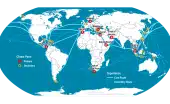Johannah Bernstein post: "eternally proud of my father’s extraordinary aeronautical engineering. legacy. here is a photo of the Canadair Water…
2012 International Year of Sustainable Energy for All
Written by Diana Thebaud Nicholson // December 6, 2012 // Sustainable Development // Comments Off on 2012 International Year of Sustainable Energy for All
20 August 2013
So much for sustainable energy
The Day the Earth Ran Out
The Causes and Consequences of Earth Overshoot Day
Sustainable Energy For All
More than three billion people in developing countries rely on traditional biomass for cooking and heating. One and a half billion people are without electricity and even when energy services are available, millions of poor people are unable to pay for them.
Thus, there is an inextricable link between energy and sustainable development and modern, cleaner and more efficient energy is relevant in the eradication of poverty. More
The Poor people’s energy outlook 2012: Energy for earning a living tries to understand, communicate, and ultimately contribute to changing the very real experiences of people living in energy poverty. It has been written to engage policymakers, governments, donor agencies, civil society and energy practitioners in the importance of energy access, but will be of interest to anyone wishing to gain a greater understanding of the energy needs of poor people around the world.
++++++++++++++++++
Green thinking takes root in midst of desert in Doha climate talks
(The Guardian) Are oil-rich Gulf states, once a byword for waste and excess, really now leading the world on sustainable development?
Until recently, the Gulf Co-operation Council (GCC) states were the epicentre of unsustainable global development, a byword for waste, excess and ecological irresponsibility. Their huge consumption of natural resources and flouting of nature on the back of oil and gas production shocked even hard-nosed observers of global oil wealth.
Well, we may have to change our views. From my hotel window, I can see 14 monster buildings being built, each to a much higher energy standard than the law demands in the US or most of Europe. Down the road is a new $70m (£43m) test-bed for carbon capture, the beginnings of a 200 megawatt solar power station, a $1bn photovoltaic manufacturing plant, new waste treatment plants, a pilot project to grow food in the desert with saltwater, and a fledgling construction industry with waste plastic.
Green baubles for the super-rich perhaps, but there is evidence that a real change of thinking is taking place. Schools, local authorities and mosques are now teaching about water and energy saving, and Gulf state governments are committing themselves to deeper cuts in emissions than the US or much of Europe.
1 July
UN Foundation Board Member Muhammad Yunus composes a forward for new green energy book
UN Foundation Board Member and Nobel Laureate Muhammad Yunus memos the forward for Nancy Wimmer’s newest book, “Green Energy for a Billion Poor – A Winning Model for Social Business” [which] illustrates the possibilities in the untapped market of billions of rural customers in developing countries who are deprived of electricity. The analysis and description of a unique business model, combined with the authentic stories of those who made it happen, make this a compelling, insightful and entertaining book.
11 June
Global investment in renewable energy powers to record $257 billion
(Science Codex) Solar generation surged past wind power to become the renewable energy technology of choice for global investors in 2011.
Solar attracted nearly twice as much investment as wind, driving the renewable energy sector to yet another record-breaking year, albeit one beset with challenges for the industry, according to two new reports on renewable energy trends issued today by the United Nations Environment Programme (UNEP) and the Renewable Energy Policy Network for the 21st Century (REN21).
Global Trends in Renewable Energy Investment 2012 (fs-unep-centre.org) is the fifth edition of the UNEP report, based on data from Bloomberg New Energy Finance (bnef.com), and has become the standard reference for global clean energy investment figures.
6 June
(Treehugger) UNEP Awards 2012 Champions of the Earth in Rio de Janeiro:
The Champions of the Earth Awards recognize individuals in a number of fields. From science to business, politics and the grassroots, the 2012 laureates come from a wide range of fields and very different backgrounds. What they have in common, however, is the thing we all should strive for. In each case, the story of these people is one of being an observant and a caring human, recognizing the problems in their respective regions or situations, learning about the core issues causing these negative situations and using strong intellect to figure out ways to change the status quo for the benefit of humans, wildlife and the environment everywhere. To put it in simpler, cruder terms, it’s really just paying attention and giving a damn.
4 June
UN Environment Programme names its ‘2012 Champions of the Earth’ winners
(UNEP News Release) A country president, a banker, an aeronaut, a scientist, a renewable energy businessman and a conservationist were today named as the six winners of the United Nations Champions of the Earth 2012 award, given to those whose actions and leadership have had a positive impact on the environment. … The awardees are Mongolia’s President, Tsakhia Elbegdorj; Brazilian banker Fábio C. Barbosa; renewable energy entrepreneur Dr. Sultan Ahmed Al Jaber from the United Arab Emirates; Swiss aeronaut Dr. Bertrand Piccard; Dutch scientist Dr. Sander van der Leeuw; and Kenyan Maasai conservationist Samson Parashina.
23 May
Inclusive Green Growth: The Pathway to Sustainable Development
(World Bank) Inclusive Green Growth: The Pathway to Sustainable Development makes the case that greening growth is necessary, efficient, and affordable. Yet spurring growth without ensuring equity will thwart efforts to reduce poverty and improve access to health, education, and infrastructure services. Countries must make strategic investments and farsighted policy changes that acknowledge natural resource constraints and enable the world’s poorest and most vulnerable to benefit from efficient, clean, and resilient growth. Like other forms of capital, natural assets are limited and require accounting, investment, and maintenance in order to be properly harnessed and deployed. By maximizing co-benefits and avoiding lock-in, by promoting smarter decisions in industry and society, and by developing innovative financing tools for green investment, we can afford to do the things we must.
29 March
The (Canadian) Federal budget makes a mockery of the international year
Ottawa to speed environmental reviews for energy projects
Lays out time limits for environmental reviews; steps up fight with oil patch foes by imposing tougher scrutiny of green charities
20 March
Access to energy – necessary but not sufficient to cut poverty
The UN estimates that 1.4 billion people have no access to electricity, hurting their ability to earn a living or educate their children. But connecting to an electric grid may not be the only solution.
(CSM) The UN estimates that 1.4 billion people have no access to electricity, either because energy services are not available or because they cannot afford to pay for them. While that sounds inconvenient to people who can switch on a light bulb or charge their cell phones at any time, the need for energy is about much more than convenience.
Access to energy affects how much time a child can spend on his or her homework; it determines how a family cooks (which has implications for health – traditional cookstoves, for example, are big contributors to respiratory illness) and how much time is spent on this task; and it impacts a person’s ability to earn income, whether it’s light to keep a shop open at night or fuel to operate an irrigation pump on a farm.
Getting clean cookstoves into homes in Tanzania
A workshop on the outskirts of Dar es Salaam, in Tanzania, each month is producing some 400 locally-made cookstoves made with clay liners that, at a cost of $6, emit far less smoke and pollutants, and use about half as much fuel. The Global Alliance for Clean Cookstoves aims to make efficient cookstoves available to 100 million households by 2020. The Huffington Post (3/9)



